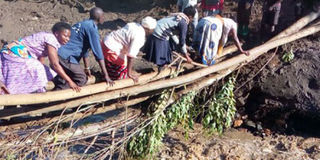Subduing the earth the godly way

Survivors of the Bududa landslides make their way to a safer place. File photo
After several similar major occurrences in the same area, would it be proper to identify Bududa with landslides? Does God have any say in the matter?
While landslides are considered naturally occurring disasters, mining and timber harvesting are known to be the major human causes. Mining activities that utilise blasting techniques, weaken the soil.
Timber harvesting that eliminates old trees from the area, destroys the existing large support roots, followed by a period of an increase in extreme and unexpected rainfall. According to Government of Uganda analysis, Bududa landslides is a clear case of deforestation since 2007.
Many people justify human interference with nature in terms of God’s command to “subdue the earth” as given in Genesis 1:26. Yet the command, in no way, gives man free rein to exploit the planet to his uses and abuses; for his own benefit.
Since God is the Creator, He would be making a ridicule of himself by commanding us to destroy the beauty of nature. In any case, Genesis 2:15 parallel account of creation, adds that God took man and put him in the garden of Eden to tend and keep it.
To “tend” can signify “to till or cultivate, or improve. To “Keep” means “to exercise great care over.” A caretaker maintains and protects his charge so that he can return it to its owner in as good or better condition than when he received it. God gives mankind stewardship over the resources He has so abundantly provided.
The Garden of Eden was a place where man’s work “to tend and keep” what God had made was pleasurable, fulfilling, and probably not overly strenuous. The earth cooperated with the man to produce his needs like food, clothing and shelter.
But after the rebellion of Adam and Eve, as mentioned in Genesis 3:17-19, God drove them from the Garden of Eden. The ground, from which comes all material wealth and produce, turned uncooperative. The situation became man versus nature; a competition for dominance. Under the circumstances, man would have to use all his physical and mental powers to subdue the earth.
The earth would yield its fruit only after a man forced it through hard labour in ploughing, planting, watering, cultivating, and reaping. Animals and insects, fearful of man, would become pests and destroy his crops, herds, possessions and even his life on occasion.
Materials for building homes, crafting tools, making clothing, and manufacturing items would be gathered only by raping the land of minerals, metals, wood, and stone.
The earth would protest through natural processes like earthquakes, volcanoes, landslides, wildfires, erosion, and infertility. Stripped of trees, the land would become a desert. The weather would turn foul, sending too much or too little rain. Windstorms would devastate vast stretches of territory. The sun would beat down mercilessly or withhold its heat for long stretches.
Mankind should consider and address environmental concerns. Francis of Assisi (1182=1226), the saint of ecology, is known to have appreciated the importance of living in harmony with nature and the power of simple living.
Francis’ brotherhood included all of God’s creation. The sparrow was as much his brother as the pope. He believed that creation is good, and if we lived as if every living creature was as important as human beings are, our world would probably be in much better shape than it is.
In 2015, Pope Francis wrote “Laudato Si’: On Care for Our Common Home,” in which he calls for simple living with recourse to renewable energy, such as sunlight. “If it is the last day of life and you have a small plant, make sure you plant it”, says Prophet Muhammad.




